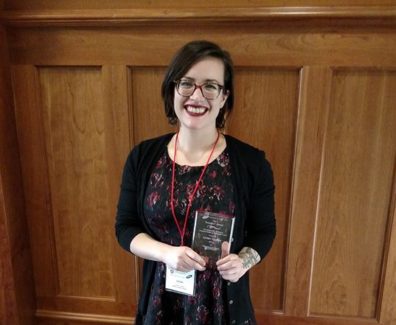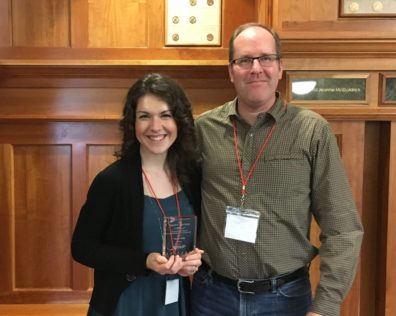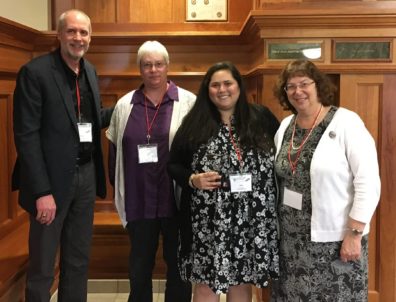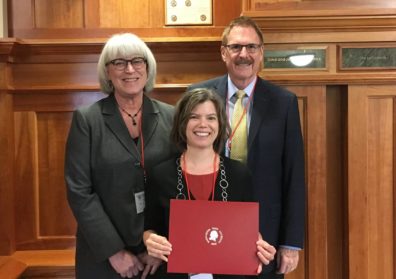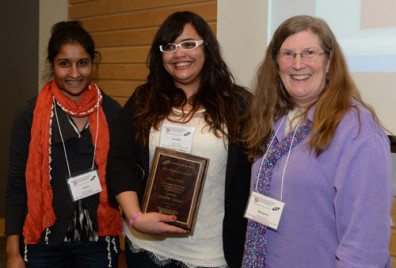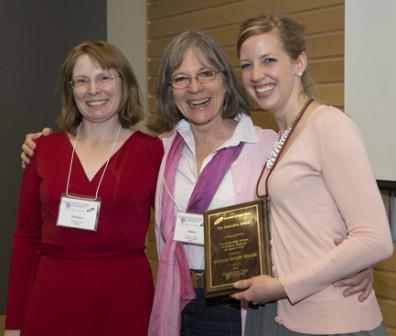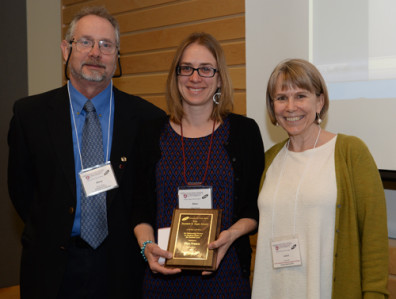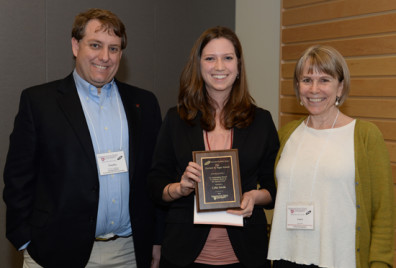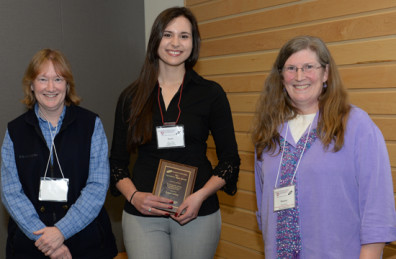The Association for Faculty Women announces its 2015-2016 award winners for outstanding women in graduate studies. These awards recognize superlative academic and scholarly accomplishments, as well as professional potential of women graduate students at WSU completing their degrees in the 2015-2016 academic year.
AFW Founders Award
The AFW Founders Award is presented to outstanding Master’s students.
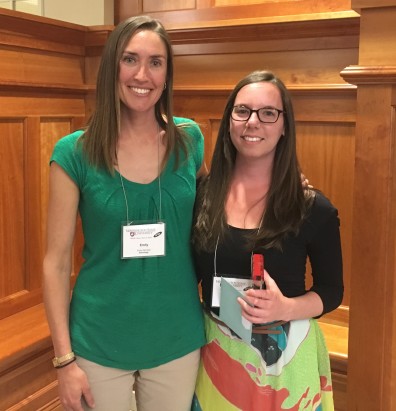
Elizabeth Dzialo
Thesis title: “The Feminization of Environmental Responsibility: A Cross‐National Quantitative Analysis.”
Chair: Dr. Emily Huddart‐Kennedy, Department of Sociology
Ms. Dzialo’s interests lie at the intersection of environmental sociology, social inequality, and social change. She is interested in the relationship between environmental sustainability and social justice with a focus on gender. Her thesis focuses on the gendered nature of participation in private‐sphere pro‐environmental behaviors (e.g., recycling, buying organic) — what is termed the “feminization of environmental responsibility” — cross‐nationally. She recently co‐authored an article for Sociology Compass with her mentor, Dr. Emily Huddart‐Kennedy, calling for more critical gender theorizing in the field of environmental sociology. She is further interested in the role of art and the collective imagination in social change and she plans to explore this in future research.
During her master’s program, she has published two articles and has two more in progress. She has taught three different courses over four semesters as a Teaching Assistant while serving in the United Students Against Sweatshops (USAS) WSU and as Programming Committee Member for EARThS.
Harriett B. Rigas Award
The Harriett B. Rigas Award is presented to outstanding PhD students.
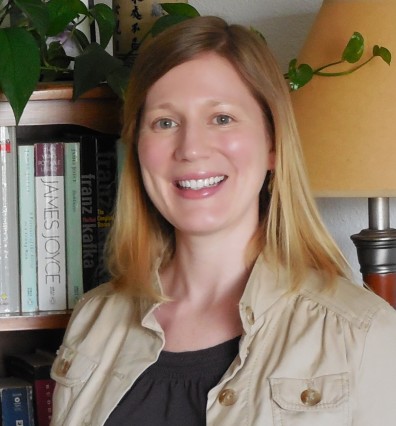
Lori Beth De Hertogh
Dissertation: “Community-Based Digital Literacies: A Cyberfeminist Analysis of Literacy Practices in Birth Without Fear.”
Chair: Dr. Kristin Arola, Department of English
Lori Beth’s research examines the influence of online communities on women’s healthcare choices and experiences in healthcare systems. Her findings demonstrate that online communities and digital technologies (e.g., health apps, social media sites, and videos) play an important role in shaping women’s experiences within healthcare systems in both positive and negative ways. She is currently working on a project that analyzes how online communities help women of color increase their access to healthcare information and services regarding breastfeeding.
She has an MA In English from Appalachian State University, a BA from The University of Southern Mississippi and will begin her role as Assistant Professor at James Madison University in August. In addition to twelve scholarships, grants and fellowships, thirty-one presentations and invited talks, she has published four articles and three book reviews. An award winning teacher, she has taught thirteen different courses at Appalachian State and University of Massachusetts Dartmouth.
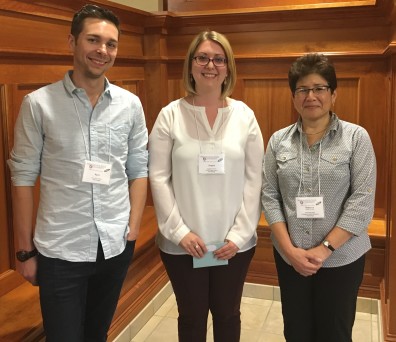
Angela M. Henricks (Williams)
Dissertation: “Alcohol withdrawal Alters Negative Affect and Endocannabinoid mRNA in a Sexually Dimorphic Manner.”
Advisors: Dr. Ryan McLaughlin and Dr. Rebecca Craft
Angela’s research examines the role of the endocannabinoid system in stress-related and drug withdrawal-related behaviors. Her dissertation project is focused on evaluating how mesocorticolimbic endocannabinoid signaling is altered by chronic intermittent alcohol exposure, and whether pharmacological enhancement of this system can mitigate stress-related behaviors such as anxiety during acute withdrawal. With the co-mentorship of Dr. Rebecca Craft, she is also assessing whether estradiol contributes to the sexually dimorphic effects of acute alcohol withdrawal on endocannabinoid-related genes, as sex/hormone-dependent changes in the endocannabinoid system could offer insight into why women report disproportionally more psychiatric problems than men in response to alcohol abuse. This line of research is particularly important to her as it could contribute to the development of more efficacious therapies for alcoholism in women.
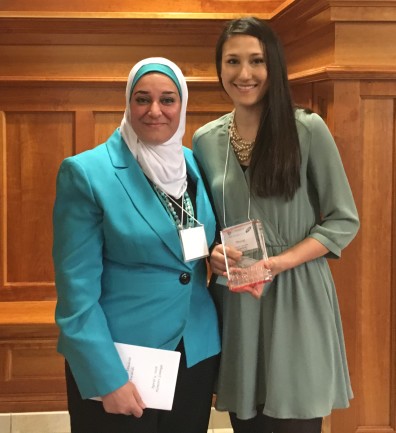
Chrystal R. Quisenberry
Dissertation: “Nanomechanics in Cartilage Tissue Engineering”
Chair: Dr Nehal I Abu-Lail Schol of Chemical Engineering and Bioengineering
Familiar with and impressed by her achievements as an undergraduate both as a leader and a researcher, Dr. Abu-Lail recruited Chrystal for her lab. She summarizes her research saying “Although more than 27 million people in the U.S. suffer from the joint disease osteoarthritis, current treatments do not restore the full functions of the tissue. Because articular cartilage is avascular, meaning it lacks blood vessels, it has a limited capacity for self-repair. This has prompted researchers to focus on cartilage tissue engineering. As cartilage acts as a load bearing surface, one of the challenges in tissue engineering is creating a construct with mechanical properties near that of native cartilage. We, along with our collaborators, use a bioreactor to apply loads to the growing tissue with one of our intentions being to improve the tissue’s mechanical properties which is then measured using an atomic force microscope.”
Chrystal has received thirteen scholarship and awards including a NASA Space grant and an NIH grant. She has worked as a TA in four classes and mentors five students as a Future Cougar of Color Ambassador. She has published four journal articles in peer-reviewed journals and presented at twenty-four conferences.
Karen DePauw Leadership Award
Sylvia Omulo
Sylvia comes from a very poor family in Kenya where her father sacrificed to educate his children including his daughters. “Sylvia is working on a doctoral project that is tackling one of the most important challenges of our time – the continuing emergence and expansion antibiotic resistance. There is strong evidence that antibiotic-resistant organisms originating in poverty-stricken areas can be globally disseminated. Sylvia chose to examine the important question of whether antibiotics are required for maintaining a resistant bacterial population in individuals within an informal settlement (slum) in Kenya, and whether simple procedures such as maintaining clean buckets and washing hands can significantly impact the level of antibiotic resistance in this setting. What seems on the surface a simple set of experiments is incredibly complicated in the setting in which she has been working to collect her samples. The informal settlement of Kibera in Nairobi is a very challenging place to work. Sylvia’s leadership in designing and conducting this study, from obtaining the required permits to assembling and leading the local team, from setting up the local laboratory to working with the individuals whose lives will be impacted by her work, has been simply astonishing to watch. She is a born leader, and is now in the final stages of sample collection before returning to the Allen School for her analysis of those samples.” Sylvia hopes to return to Kenya to teach at a public university with the long-term goal of working with the World Health Organization to help women and children in poor countries.
Cristina Wilson
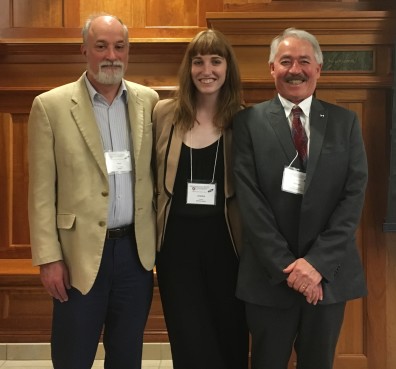
In addition to her three manuscripts, six presentations, and strong teaching skills, Cristina has encouraged and mentored undergraduates to present at SURCA. “She wrote a proposal and application for a CAS Undergraduate Innovators Initiative grant whose primary goal was to provide faculty, graduate students and undergraduate student research teams with the proper use of psychophysiological methods and their relevance to psychological research. Our department did not have this kind of lab when Cristina applied for the grant. Her motivation was to teach and learn human, psychophysiological methods, and to help the department establish an active psychophysiological laboratory [which includes managing use of both electroencephalography (EEG) equipment and galvanic skin response (GSR) equipment]. The leadership role Cristina took on was an immense amount of work—particularly for a graduate student. Over the last year, Cristina has purchased needed EEG equipment and supplies (from grants she has written and received as well as from departmental funds), and has setup new lab space to allow multiple research teams access to the EEG equipment and monitoring systems. Cristina also organized and led research teams (from three different research labs) with introductory training sessions. She also organized and hosted a guest speaker (Dr. Emily Kappenman) who provided a three-day EEGboot camp. Ten undergraduates, eight graduate students and three faculty members from the Psychology Department attended the three-day “Introduction to EEG” boot camp.










